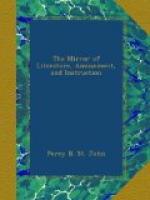Not such as softly rise
When boughs with song o’erflow,
And lover’s vows and sighs,
Like incense breathe below;
Not such as warm his breast,
Whose fever’d anxious
brain
Toils when all else hath rest,
To bring the lost again!
But the owl’s boding shriek,
The death-cry of his prey;
The tongues that durst not speak
In bright unslumb’ring
day;
The murd’rer’s curses fell,
His quiv’ring victim’s
groan;
The mutt’red, moody spell
Which rocks ABADDON’S
throne!
The song of winds that sweep
Impetuously around
Our rolling sphere, and keep
Up conferences profound;
The music of the sea,
When battling waves run mad;
Far sweeter there may be,
But none so wild and sad.
The wail of forests vast
Thro’ which pour storms
like light,
Whilst rending in the blast,
They feebly own its might!
Deep thund’rings o’er the
main:
The short shrill smother’d
cry,
Hurl’d to the skies in vain,
Of drowning agony!
The SOMETHING toneless, which
Speaks awfully to men,
Startling the poor and rich,
For CONSCIENCE will
talk then;
These are the watch-words drear,
The Voices of the Night,
Which harrow the sick ear,
The stricken heart affright!
Great Marlow, Bucks.
* * * * *
MANNERS & CUSTOMS OF ALL NATIONS.
* * * * *
MAY-DAY GAMES.
(For the Mirror.)
This day of joyous festivity has almost ceased to be the harbinger of mirth and jollity; and the gambols of our forefathers are nearly forgotten amidst the high notions of modern refinement. Time was when king, lords, and commons hailed May-day morning with delight, and bowed homage to her fair and brilliant queen. West end and city folks united in their freaks, ate, drank, and joined the merry dance from morning dawn till close of day. Thus in an old ballad of those times we find
The hosiers will dine at the Leg,
The drapers at the sign of the Brush,
The fletchers to Robin Hood will go,
And the spendthrift to Beggar’s
bush.
And another
The gentry to the King’s head,
The nobles to the Crown, &c.
The rustic had his morrice-dance, hobby-horse race, and the gaudy Mayings of Robin Hood, which last were instituted, according to an old writer, in honour of his memory, and continued till the latter end of the sixteenth century. These games were attended not by the people only, but by kings and princes, and grave magistrates.




